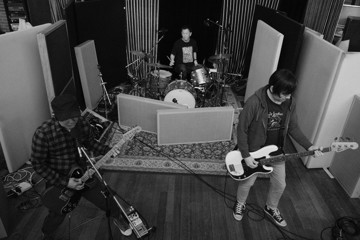'Captain America: Civil War' Makes Up For The Failures Of 'Age Of Ultron'
"Who can even remember what blockbuster season was like before the super-hero revival?"
captain america: civil war

It feels weird to type ‘an expert exercise in brand management’ as phrase of critical praise, but, well, welcome to 2016, I guess. Captain America: Civil War is a film that functions —and succeeds— not as a singular work. Instead, it’s the latest cog in what’s become a well-oiled machine: a Marvel Cinematic Universe product that embodies the best aspects of our multiplex overlords; marrying political resonance with bright colours, action set-pieces with comic banter, individual agency with institutional loyalty.
And, really, it’s a Captain America film in name only. There’s never any suggestion that this is a standalone story, obviously, nor can it really function as one. No viewer is expected to arrive at Civil War without a thorough grounding in MCU history. When Paul Bettany —no longer just a KITT-like voice inside Robert Downey Jr’s head, now the quasi-mystical android Vision— gives a speech about the rise in super-powered individuals and the resulting rise in potential world-ending events (with attendant self-aware irony), he begins “in the eight years since Mr Stark announced himself as Iron Man”. In another work, this might be seen as filling in new viewers, but the Marvelverse operates with no such concessions, only arrogance. Instead, it feels like he’s getting sentimental for those who’ve been there that whole time; remember-when-ing back to the beginnings of this billion-dollar behemoth. It’s only been eight years, but it’s been eight long years. Who can even remember what blockbuster season was like before the super-hero revival?
Don't miss a beat with our FREE daily newsletter
Anthony and Joe Russo, the directors of Civil War, are banking that no one does; and that no one coming to see their film will do so without prior knowledge of past instalments of various franchises. This film doesn’t pick up where 2014’s Captain America: The Winter Soldier, left off, but, instead, is a successor to last year’s The Avengers: Age Of Ultron. The fact that it wears one character’s name in the title is a mere formality of franchise-alternating; especially given just how many MCU IPs populate the narrative.
Though there’s respect paid to the narrative through-lines of the Captain America films —Bucky! Agent Carter! The disenfranchisement of the All-American hero!— the chief dramatic concern of Civil War is the fallout from that really-stupid climax to Age Of Ultron where James Spader lifted a whole country into the sky. The fake country name ‘Sokovia’ spoken aloud throughout, the central storyline etched with guilt from all that happened when such an idiotic idea was thrown at the feet of an army of CGI technicians. The Avengers may’ve saved the day, but there’s blood on their hands; countless deaths that weigh on their consciences.
That’s, essentially, what splits up our cadre of caped characters into warring factions; RDJ’s Mr. Stark wanting to sign an accord limiting the powers of the Avengers, Chris Evans’ titular Cap adamant that they must maintain their unilateral freedom. And, stirring the pot is Daniel Brühl’s civilian villain, a not-all-powerful, not-planet-threatening foil who just wants to see the good guys tear each other apart, he believing they should feel responsible for all the destruction they played a part in.
This makes Civil War feel not just like the latest Avengers film, but play as an apology for the excesses and failures of Age Of Ultron. Especially given that directors Anthony and Joe Russo succeed where Joss Whedon didn’t: managing to make a film that has no individual dramatic agency —that exists as one-part of a multi-franchise machine, and feels as much like an ad for future instalments as its own movie— but that doesn’t make you hate it for that fact.
“Spider-man will return” is the final promise made, after the final post-credits sting; and, well, duh. As Civil War closes the door on the Captain America trilogy, it opens every window in the house. We’re introduced to Chadwick Boseman’s five-picture-deal Black Panther —an African King “dressed as a cat”— and Tom Holland’s Spider-Man —a smart-ass teenage newbie with way-hot Marisa Tomei as Aunt May— to prime them for future standalone spin-offs. Scarlett Johansson, six films deep into her Black Widow turn, never got to be so fast-tracked; even though her ballet-school back-story was the best moment of Age Of Ultron, and her hair looks amazing no matter how volatile or violent the fray. I guess that’s what she gets for having a vagina.
There’s also Anthony Mackie, crackin’ wise; Don Cheadle, earnest and grim; Paul Rudd, reminding you that Ant-Man was unexpectedly delightful; Elizabeth Olsen, frowning whilst red CGI energy glows in her hands and pixels are sent flying; Jeremy Renner, the dad-rock super-hero self-aware of his third-tier status; and Sebastian Stan, a man torn between ol’ Bucky and murderous Winter Soldier. And, wait, I think that’s everyone. Gwyneth Paltrow, Mark Ruffalo, and Chris Hemsworth are all given excused absences, spoken about in the dialogue, but not contractually-obliged to appear.
As they did with The Winter Soldier, the Russos again lean on the tropes of the political-thriller to drive their engine: from the global panoply of city names typed on screen, to the sunglasses-and-caps Mackie and Evans wear to disguise themselves in crowds, to the hearty philosophical discussions the Avengers have in round-table meetings.
Whilst its crowning achievement, and raison d’être, is the six-a-side, Avenger-on-Avenger showdown —where planes are trashed, punches are pulled, friendly banter is bountiful, Spidey brings the lulz, and Bettany is essentially sidelined because the Russos apparently have no idea how he should do something so prosaic as ‘fight’— Civil War is a film about chaos and control; about the tortured on-again/off-again friendship between Evans and Stan; and about whether super-hero movies should be able to fill their screens with endless murder victims, yet never feel the consequences, or be met with proper pushback.
In that latter question, it’s impossible not to think of Zack Snyder’s bloated, bombastic, brutal, deeply-stupid Batman V Superman: Dawn Of Justice, in which the body-count was endless, and its once-principled caped-crusaders turned into ruthless killing machines. There’re similarities between the two —villain baits the two biggest heroes of comic-book publishing-houses into fighting— but they also feel radically different. Civil War is light, colourful, quick-moving, and often funny; and it has a real handle on real emotions, not contrived pathos and jerry-rigged tortured-backstory cliché.
So, sure, Civil War feels like an apology for Age Of Ultron, and a corrective for past MCU sins. But, ultimately, its greatest success comes from its proximity to one of the year’s most maligned films. If you were the random man-of-the-street who wandered into this film completely anew, it would feel deeply confusing, incomplete, almost incoherent. But Civil War plays warmly for anyone grounded in the dual franchises —Captain America and The Avengers— it builds off of. And, it plays like a sheer delight for anyone whose last cinematic super-hero experience was helmed by Snyder.







